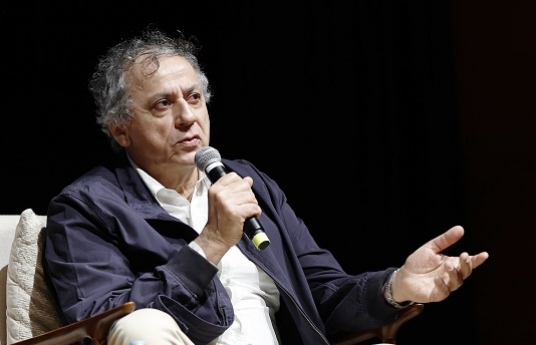Qumra Master Darius Khondji underlines the power of storytelling through light – or the lack of it – to deliver authentic works of art
Apr 06, 2025

Doha, Qatar; April 6, 2024: Qumra Master Darius Khondji, the acclaimed Iranian-French cinematographer whose body of work (Se7en, Delicatessen, Uncut Gems, Mickey 17) has defined some of the most memorable visual experiences in contemporary cinema, highlighted the power of light and its its vital role in the composition of authentic art.
Reflecting on his first collaboration with Qumra 2025, the annual industry incubator event by Doha Film Institute, he stated: “The institute is fantastic for filmmakers. I wish we had this in other countries.”
During his two-hour master class, Khondji took audiences behind the scenes of his celebrated projects, including acclaimed filmmaker Shireen Nishat’s Tooba, a compelling work of art that “explores the movement of people from their homeland to an imagined utopia.”
The powerful allegories about life that Khondji captured on screen for Tooba, he says, “come from the director. I remember her words when she was describing to me what she wanted to make with the film, and I just photographed. As cinematographers, we are like musicians, playing the sound and music given by the composer.”
Khondji’s frames—dark and broody in Se7en (1995) hopeful and effervescent in Okja (2017)—all stem from his early passion for photography. “I remember going to the Louvre and taking pictures of the statues and looking at the light on them. I was very interested in minimalism and I was always reducing things to the most simple [forms] with light.”
A two-time Oscar nominee, Khondji perfects his craft with a creative approach overtechnical, constantly innovating in a way that defies categorisation. His impressive versatility as a cinematographer is evident in The Lost City of Z (2016), capturing the darkness of the jungle in natural light, contrasted with the spellbinding climax in flames, and in the frenetic Uncut Gems (2019), shot in available light inside an apartment.
Khondji—whose father owned several movie theatres—said his early memories of cinema revolved around “listening to soundtracks of Egyptian films, Italian neorealist films, mainstream European films, and Indian films. I remember having this background of sound and feelingTo this day, music is crucial to his work. “If I don’t like the music, we do some okay photography, but my mind won’t be in it.”
By the time Khondji was 12, he was already making films. Fascinated by horror flicks such as Dracula and wanted to be a director, but eventually realized hi calling as a cinematographer. As a director of photography, his diverse journey also includes the music video for Madonna’s Frozen, for director Chris Cunningham. “Every frame was in his mind, and Madonna and I were just doing what he wanted. It was a great way to play with the medium, to experiment,” observed Khondji.
Khondji says that “films have a painterly quality; it is all about how you translate your story onto the screen—whether using film or digital.” With regards to AI, he commented: “I love making film with people—I love having people around me, having a crew, having a director, men and women, and making films together. However, I don’t want to limit people’s minds; people should always continue discovering. “
Asked about his advice for emerging filmmakers who strive to stand out, he said that everyone has a distinct inner voice. “It’s important to understand and accept your difference. If I had to make a film myself today—and I’m not a young filmmaker—even for me, it would be difficult to have a unique voice. We have to find it within ourselves, then put it on screen.”
On accepting his own differences, he added: “When I was a child, I wanted to be like everyone else. I wanted to look French or Parisian. It was only later that I realized I was different and accepted that my difference can be a good thing.”
Whether working on his breakthrough black comedy Delicatessen (1991) with Jean-Pierre Jeunet and Marc Caro, or capturing the haunting visuals of David Fincher’s Se7en, Khondji believes that cinematography must serve a higher purpose: “It’s not just pretty photography, but storytelling.” This guides his approach across four decades of groundbreaking work, from arthouse classics to enduring contemporary masterpieces.